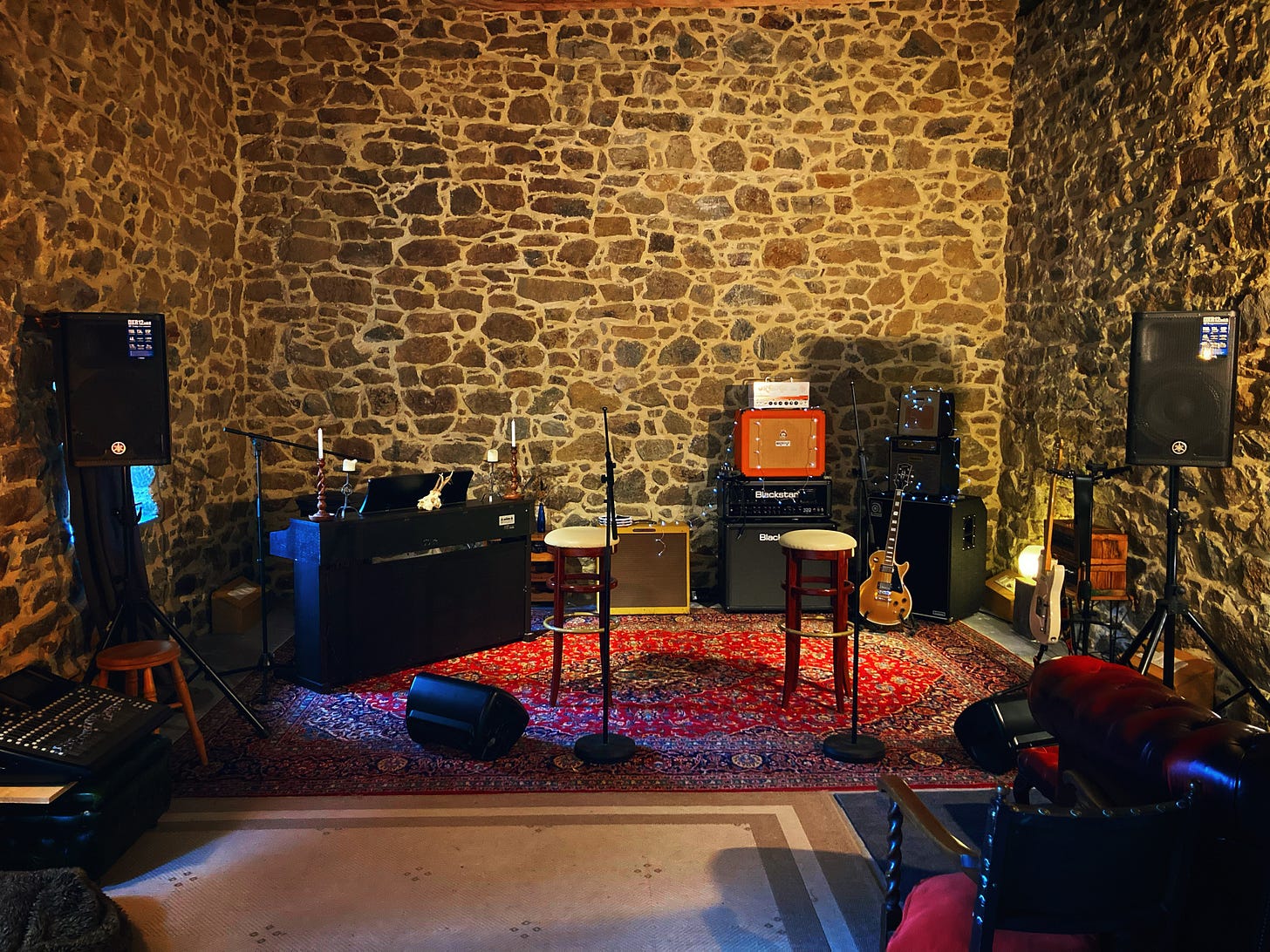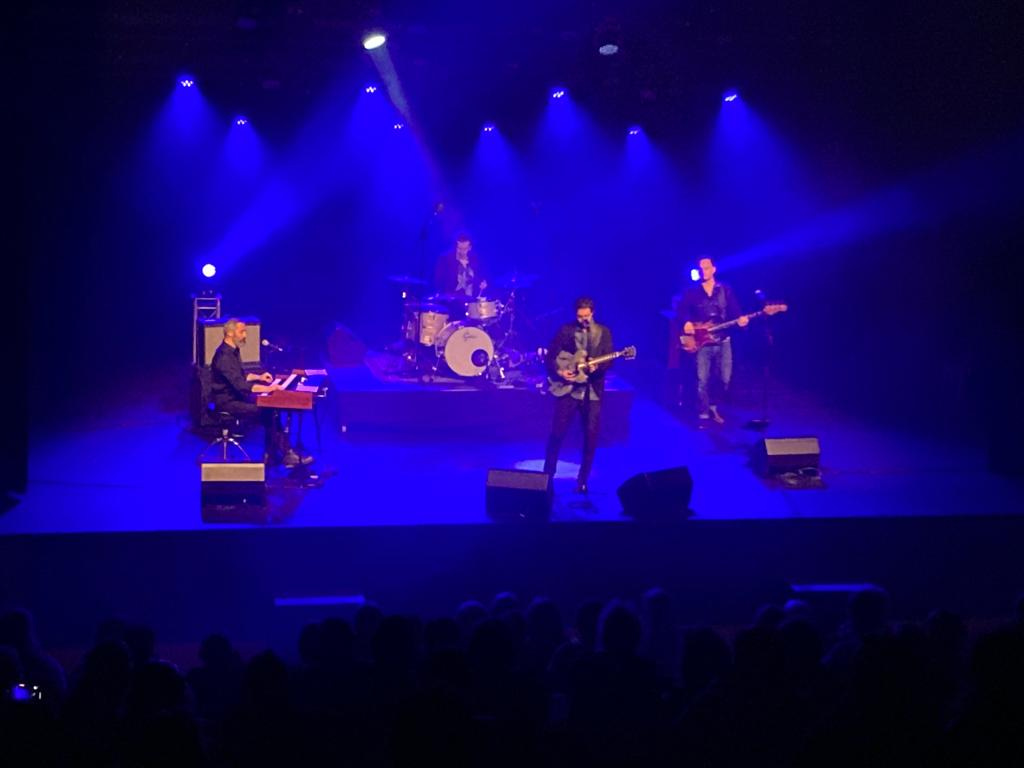Hello Readers!
I’ve been away a while, but don’t worry I’m fine.
In fact, I was just sitting down to write a new issue of my newsletter and I found an unplublished letter in my drafts. I don’t exactly how long it’s been there, but it’s over a year old, as I stopped the backline work last August.
It’s also from before the studio was operational, which reminds me just how much we’ve managed to do in the last year. Sometimes, it’s easy to feel like you’re just treading water, until you look back and see just how far you’ve swum.
Reading through, I expect this was a “puke draft”, so here be typos. I like the phrase ‘puke draft”. I learnt it from my writer friend Mike Sizemore, who has a much better newsletter than mine called Midnight Quatermass here. He also throws in a free short story each week, so I’d head over and subscribe, if I were you.
Anyhoo, while I’m working on my latest letter, you can find out where I was at a year ago…
I have really been struggling to find the time and energy to keep up with the newsletter, as not only am I doing my mixing and mastering work, I’m also doing a lot of live sound as well as other music adjacent jobs, like backline. I’m spending a lot of time feeling very tired and very sore, but it’s all bringing in that extra funding that I need to build our dream studio.
Things are progressing, albeit slowly with the new studio and by next week we should have installed the new floor and the basic network of cable for the live room. Yay! After that, I need to build a new door, insulate the ceiling, install a new circuit board, clean and treat the beams… the list goes on.
L’histoire
I have been doing live sound in France since things first started opening up after the pandemic, which I talked about in a previous edition called Tucker’s Luck. I didn’t have a lot of experience as a live sound engineer in the UK, but I had a lot of experience as a live musician and studio engineer, so it wasn’t a fairly logical progression.
Live sound as been very useful as a fun side job and it all came about via a chance meeting.
When we first moved into our French home, we were still under semi-lockdown conditions, so we couldn’t socialise inside, or do much off our property except food shopping and dog walking. On one particular dog walk, we were trying to find the house of the farmer who owns the land around our property, as we wanted to take him a gift as a small thank you for a favour he had done us.
We knew the general area of his house, but weren’t sure which one was his. By chance, a family pulled up in a car at one house, so we awkwardly asked if they knew where the farmer lived. All this was done in loud voices from several metres apart, as per the rules at that time.
As it happens, this family went on to become among our closest friends and we hang our with them all the time.
The dad of the family loves connecting people and he introduced me to the manager of La Grande Ourse, who asked me would I be interested in doing live sound for them when their regular sound guys were unavailable. Initially, I worked there as a volunteer, assisting the regular sound engineer, until, eventually, I started getting booked as the engineer myself. I guess I couldn’t have been too bad at it, as the other engineers started recommending me to other companies looking for engineers.
The Madeleine
Whenever I use the phrase “Too busy earning a living to make any money”, I think of Peter Frampton (no not that one). Peter Frampton was one of the lecturers at the FE college where I studied before starting my music degree. Peter was a fantastic blues country guitar player with long silver hair and beard. If I had to describe him to somebody, I would probably compare him to Sam Elliott. I seem to remember he even wore a cowboy hat.
Pete was never formally one of my teachers, but he was definitely one of my mentors. I can still hear him saying, “Cease that modal meandering!”, when I was soloing, to this day.
He was also a real champion of my band at the time, which was a folky, jazzy, proggy thing called Marshes Farm. Pete recorded and mixed our first demo on his own time for free and was incredibly encouraging.
Sadly, Marshes Farm only went on to record one album, before splitting up. It was a self funded album which we managed to record cheaply by taking the unpopular 21:00-09:00 slots at a studio called The Cutting Rooms in Manchester. It was recorded and mixed over three nights with a French engineer called Christophe Bride. We recorded it live to tape, with only a couple of extra guitar solos and vocals being made as overdubs. Foolishly, we also saved money by not buying the multi-track tape, so it’s never going to be possible to remix the album, although I did do a remaster of it that you can find for free here.
Sadly, last year, Simon Goulding, the bass player of the band passed away. Simon was a truly lovely person and possibly the most gifted musician I have ever met. When he joined Marshes Farm, he was only 17 and was already out playing everyone around him. He went on to have solo career, become and established jazz and blues sideman, as well as play in the backing band of some extremely well known artists, including Peter “Garlic Bread” Kay.
The Sounds
It was during my college days and my stint in Marshes Farm that I first began my love affair with all things Hungarian.
One of my favourite guitarist at the time was King Crimson’s Robert Fripp. I could never work out why he sounded so different to other guitarists. It was obvious he didn’t belong to the blues, or even really jazz, tradition, so where did his sound come from?
Eventually, I discovered in Eric Tamm’s book on Robert Fripp, that Béla Bartók’s string quartets had been very important to him during a very formative stage. Armed with this information, I sought out these aforementioned string quartets and the course of my life was forever changed.
Eagle-eared readers might notice that that particular opening shares a certain amount of DNA with the music for the shower sequence in Alfred Hitchcock’s Pyscho. Well, you are absolutely correct. Bernard Herrman took a lot of inspiration from Bartók’s quartets for Psycho soundtrack.
As so often happens, everything connects somewhere with The Beatles. George Martin, The Beatles’ producer, has several time that the string arrangement for Eleanor Rigby was inspired by the Psycho soundtrack.
So, it seems that I was inspired by Bartók’s music even before I heard it.
My following obsession with the music of Béla Bartók eventually lead to me living in Hungary for four years to make an in depth study of Hungarian music, literature, language and culture. Eventually, I even became a Hungarian citizen! You can read a little more about that in Pork and Bean Soup.
During the period I was living in Hungary, I didn’t really pay much attention to rock and pop music there. I was totally immersed in classical, folk and world music and had developed a certain snobbery about rock music that I wisely discarded once I hit my first mid-life crisis.
To make up for this neglect, I’m often on the look out for Hungarian rock and metal groups and this one caught my attention on Instagram. I love me a nice shouty singer!
Loudwire recently ran a feature with the band where they choose 11 Hungarian metal band that they feel define the country’s music scene. You can read that article if you click here.
This is the End…
I hope you have enjoyed this latest edition of From The Devil’s Coach House. I promise I won’t keep you waiting as long for the next one.
In the meantime, if you haven’t already, don’t forget to check out my website and Bandcamp pages.








Great stuff. Glad to have the newsletter back and with lots of lovely musical links to boot. Literally to boot in the case of the Beatles but you can’t have everything.
Wow, this was brilliant Steve! You've lived such an interesting life and I love hearing more about it. Thank you.